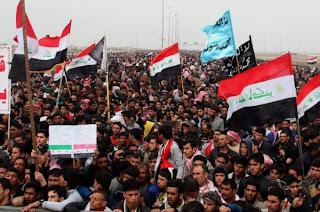Since U.S. departure from Iraq in 2011,
unrest between minority Sunnis and the ruling Shia government has increased.
While sectarian unrest is certainly not new to Iraq, the conflict between the
two religious groups has increased over the course of this year. Sunnis are
protesting to overthrow the Shia government. More specifically, Sunnis are
outraged over the sectarian policies of Prime Minister Nouri al-Maliki. Sunnis
have been imprisoned on charges of terrorism, and in December, Iraqi troops
detained Sunni Finance Minister Rafa al-Essawi. Sunnis feel disrespected and
marginalized by the Shia government and protest daily against its policies.
 |
| Sunni protestors in Iraq. Photo Courtesy Associated Press. |
On February 17, suicide blasts killed an
Iraqi intelligence officer and three of his bodyguards. One day later, a series
of deadly car bombs targeted predominantly Shia areas of Baghdad. The blasts
occurred mainly at outdoor markets, targeting ordinary citizens at peak hours.
Al-Jazeera reported that the blasts were “well-planned and well coordinated.”
Later that day, an al Qaeda affiliate claimed to be behind the attacks.
There are several important implications
regarding these events. First, it is important to point out that both
non-violent and violent tactics are being used in opposition to the Shia-led
government. While daily protests remain relatively peaceful, deadly conflict is
not uncommon. According to Al-Jazeera, January marked the bloodiest month since
last September. Secondly, a disconnect appears in the tactics used by the
different protestors. While many Sunnis participate in mass protests daily,
Sunni extremist groups, like al Qaeda, have resorted to violence in order to
accomplish their goals. Further, the violence has moved from targeting members
of the Shia-led government to ordinary citizens.
There are also important implications
for this conflict in regards to Syria. Sunni rebels in Syria are fighting
against the Shia-led government of Bashar al-Assad. Also important, Assad is
allies with Shia-dominated Iran, a state which openly sponsors terrorist
organizations. Many fear that this will intensify conflict within Iraq. What’s
more, Al-Jazeera reported that the February 17 killing took place in Tal Afar, located between an
already unstable city and the Syrian border. The fact that conflict has
increased in the Western part of Iraq means that it has the potential to be
influenced by Sunni unrest in Syria.
This past week in class we discussed ethnicity
and its relation to violence. While ethnic differences may not be a sole cause
of conflict, it certainly can be used as a tool during conflict. It does appear
that Instrumentalism is present in Iraqi unrest. Government leaders have used
their identity as a way to manipulate outcomes favorable to them. This is
evident from the imprisonment of Sunni citizens, as well as the oust of the
Sunni Finance Minister in December. In addition, Iraq is no stranger to
Sunni-Shiite conflict, making future unrest more likely.
The conflict also exemplifies Cederman
et al.’s claim that access to power is an important determinant in ethnic
conflict. What matters in determining conflict is not how diverse a society is,
but how the groups are ordered within society. If groups are excluded from
central government decision-making, they will be more likely to rebel. Sunni
members of the Iraqi government have been forced out of their positions and the
Sunni population in general marginalized. It appears that Maliki is attempting
to create an all Shiite government, excluding Sunnis from the political
process.
The recommendations I would make to Sunni
protestors moving forward is to form a coherent plan of action. In other words,
Sunnis must decide whether nonviolent or violent action is the best tactic. The
fact that al Qaeda is behind recent acts of violence against the Shia
population may undermine the overall group’s legitimacy. We have learned that
external patronage can invalidate movements. Being a large network, al Qaeda
receives support that spans beyond internal patronage. However, a resort to non-violence on behalf of al Qaeda seems unlikely given the fact
that they are an extreme terrorist organization. Given that two sets of
actors play a role within the Sunni population, it is important for ordinary
citizens to remain peaceful in their efforts and not succumb to the violence
endorsed by al Qaeda. Not only will this increase legitimacy, but it may
prevent the type of violent conflict we see in Syria from spilling over into
Iraq. Further, it may overcome commitment problems, increasing the likelihood
that all members of the Sunni minority will be willing and able to participate
in the protests.
Sources:
http://www.aljazeera.com/news/middleeast/2013/02/201321691456452100.html
http://www.aljazeera.com/news/middleeast/2013/02/20132179215437288.html
http://www.cnn.com/2013/02/18/world/meast/iraq-violence/index.html?iref=allsearch
http://www.aljazeera.com/news/middleeast/2012/12/201212308176248197.html
http://www.aljazeera.com/news/middleeast/2012/12/20121223111030429167.html
Class notes: Feb. 4, 2013; Feb. 18, 2013
Cederman, Lars-Erik, Andreas Wimmer and Brian Min. "Why Do Ethnic Groups Rebel?: New Data and Analysis." World Politics 62, no.1 (2010): 87-119.
At this stage in Iraq's history it is extremely important that the Iraqi government show itself to be fair and even-handed in its dealings with its various peoples. It should listen to their problems, meet with them, discuss the problems, and help them attain fair representation in the government. It must show and exercise genuine leadership. If it fails in this, I think it will be confronted with very difficult internal problems that it cannot solve without reverting to its dictatorial historical type.
ReplyDelete